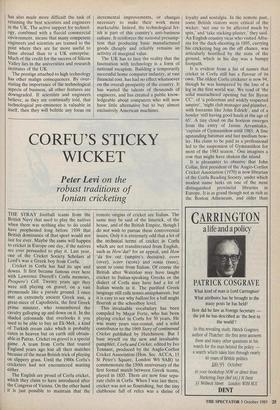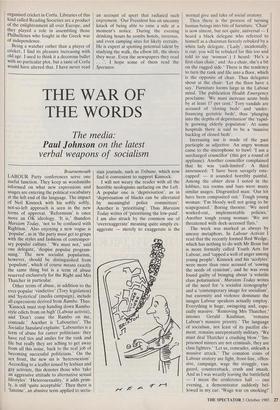CORFU'S STICKY WICKET
Peter Levi on the
robust traditions of Ionian cricketing
THE STRAY football teams from the British Navy that used to play the natives when there was nothing else to do could have prophesied long before 1939 that British dominance of that sport would not last for ever. Maybe the same will happen to cricket in Europe one day, if the natives are ever persuaded to play it. Last year, one of the Cricket Society Scholars at Lord's was a Greek boy from Corfu.
Cricket in Corfu has had its ups and downs. It first became famous over here with Lawrence Durrell's Corfu memoirs, Prospero's Cell. Twenty years ago they were still playing on gravel, on a vast promenade like a parade ground. I once met an extremely ancient Greek nun, a great-niece of Capodistria, the first Greek prime minister, who remembered the cavalry galloping up and down on it. In the shaded colonnade that overlooks it you used to be able to buy an Ek-Mek, a kind of Turkish cream cake which is probably eaten in heaven but on earth still obtain- able in Patras. Cricket on gravel is a special game. A team from Corfu that toured England years ago lost all their matches because of the mean British trick of playing on slippery grass. Until the 1900s Corfu's cricketers had not encountered matting either.
The English are proud of Corfu cricket, which they claim to have introduced after the Congress of Vienna. On the other hand it is just possible to maintain that the remote origins of cricket are Italian. The same may be said of the limerick, of the house, and of the British Empire, though I do not wish to pursue these controversial issues. Only it is extremely odd that a lot of the technical terms of cricket in Corfu which are not transliterated from English, such as How'dat? for an appeal, and How 'da for out (umpire's decision), overr (over), scorr (score) and ronia (runs), seem to come from Italian. Of course the British after Waterloo may have taught cricket to Italian-speaking Greeks or the dialect of Corfu may have had a lot of Italian words in it. The purified Greek language still calls tennis antisphairesis, but it is easy to see why balloni for a ball might flourish at the schoolboy level.
This invaluable vocabulary has been compiled by Major Forte, who has been playing cricket in Corfu for 50 years. He was many years vice-consul, and a solid contributor to the 1969 Story of continental Cricket published by Hutchinson. But I base myself on the new and invaluable pamphlet, Corfu and Cricket, edited by No Tennant, produced by the Anglo-Corfiot Cricket Association (Hon. Sec. ACCA, 15 St Peter's Square, London W6 9AB) to commemorate the 150th anniversary of the first formal match between Greek teams, played in 1835. There are now four sepa- rate clubs in Corfu. When I was last there, cricket was not so flourishing, but the tiny clubhouse full of relics was a shrine of loyalty and nostalgia. In the remote past, some British visitors were critical of the wicket: 'not one to be affected much by spin,' and 'take sticking-plaster,' they said. An English country vicar who visited Alba- nia for the duck-shooting in 1895, carrying his cricketing bag on the off chance, was articularly horrified by the state of the ground, which in his day was a bumpy footpath.
It is evident from a list of names that cricket in Corfu still has a flavour of its own. The oldest Corfu cricketer is now 94, though he was hampered by the loss of a leg in the first world war. We read of 'the solid mustachioed opening bat for Byron CC', of 'a policeman and widely respected umpire', 'night club manager and plumber, with forearms like John Edrich', and of a bowler 'still having good hauls at the age of 65'. A tiny cloud on the horizon emerges from the entry of Jannis Arvanitakis, `captain of Gymnastikos until 1983. A fine upstanding batsman and fast medium bow- ler. His claim to be paid as a professional led to the suspension of Gymnastikos for most of the 1983 season.' One imagines a row that might have shaken the island.
It is pleasanter to observe that John Collas, first president of the Anglo-Corfiot Cricket Association (1970) is now librarian of the Corfu Reading Society, under which modest name lurks on one of the most distinguished provincial libraries in Europe. It is as grand though not as rich as the Boston Atheneum, and older than organised cricket in Corfu. Libraries of this kind called Reading Societies are a product of the enlightenment all over Europe, and they played a role in assembling those Philhellenes who fought in the Greek war of independence.
Being a watcher rather than a player of cricket, I find its pleasure increasing with old age. I used to think it a decorous ballet with no particular plot, but a taste of Corfu would have altered that. I have never read an account of sport that radiated such enjoyment. 'Our President has an uncanny knack of being able to raise a side at a moment's notice. During the evening drinking hours he combs hotels, tavernas, and even camping sites for likely recruits. He is expert at spotting potential talent by studying the walk, the elbow lift, the shoes they wear. Even the newspapers they read . . I hope some of them read the Spectator.



























































 Previous page
Previous page